Hannah Gadsby’s Nanette
By Jessica Yesmine Ohaeri
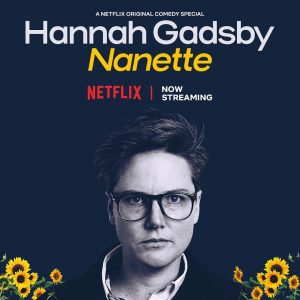
Nanette (2018) is a stand-up comedy show written and performed by Hannah Gadsby. The widely viewed Netflix special was filmed at the Sydney Opera house in Sydney, Australia. Gadsby’s quick wit and natural charm quickly catches the audience’s attention but her blunt honesty and bold authenticity is what captures the audience’s hearts.
“There is nothing stronger than a broken woman who has rebuilt herself.”
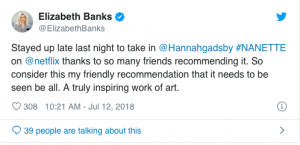
Central vocabulary:
Intersectionality
#MeToo
Patriarchy
Non-Binary
Neurodiversity
toxic-masculinity
About Hannah Gadsby:
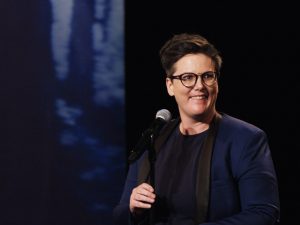
Hannah Gadsby was born in Tasmania in 1978. Gadsby’s family was from a low socioeconomic status and her mother worked as a cleaner at a local country club. She brought her children to work which is where Gadsby started golfing, she would later win several awards for it. The country club was a place where the astute Gadsby would learn about gender roles, women were not allowed to be full members. Gadsby was allowed to golf but only when it would not infringe on a men’s game.
Gadsby studied Art History at Australia National University. She got into comedy in the early 2000s on a whim. She was homeless at the time.
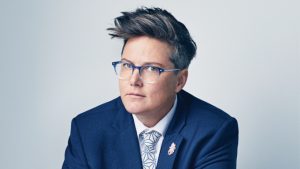
Gadsby is a non-gender conforming lesbian. She grew up at a time when it was a criminal act to be gay in Australia, and conservative Tasmania was an incredibly dangerous place for members of the LGBTQ+ community
“Seventy percent of the people who raised me, who loved me, who I trusted, believed that homosexuality was a sin, that homosexuals were heinous, subhuman, pedophiles. 70 percent! And by the time I identified as being gay, it was too late, I was already homophobic. And you do not get to just flip a switch on that.
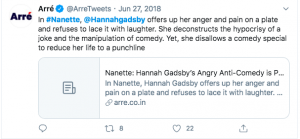
Her life has been filled with internalized shame, poor treatment and abuse. Her name is not Nanette but Nanette is her story.
Summary:
Nanette starts the way every stand-up comedy show starts- with a joke. Gadsby reveals to the audience the story behind the name of her show, “because she named it before she wrote it”. She continues on to talk about Tasmania, her experiences in small towns and jokes about “finding out that she was a bit gay” in the mid 90’s. She skillfully uses innuendo, puns and strategically placed f-bombs. She jokes about her sexuality, mocking a fan that confronted her about a previous show’s lack of “lesbian content”.
In Nanette, Gadsby provides the lesbian content that her last show did not have. She tells the audience a story about how at a bus stop she was chatting up a girl, and the girl’s boyfriend started shoving Gadsby because he thought that Gadsby was a ““f**king f**got” that was trying to flirt with his girlfriend. He then apologized and said that he “did not hit girls”.
She talks about coming out to her mother and how her mother’s response was “Oh Hannah, why did you have to tell me that? That’s not something I need to know! What if I told you I was a murderer?” The most recent comedic tale of woe in relation to Gadsby’s sexuality was her failure to remember to come out to her grandmother. She only remembers when her grandmother asked her if she had a boyfriend.

The show’s turning point starts when Gadsby announces that she needs to quit comedy and makes an incredibly profound statement:
“I have built a career out of self-deprecating humor and I don’t want to do that anymore. Do you understand what self-deprecation means when it comes from somebody who already exists in the margins? It’s not humility, it’s humiliation. I put myself down in order to speak, in order to seek permission to speak, and I simply will not do that anymore, not to myself or anybody who identifies with me. If that means that my comedy career is over, then, so be it.”
She continues on to dissect the parts of a joke, tension and release. Gadsby is a master of comedic timing. She revealed that she got good at being funny because she was always around tension. Hannah “was the tension, it was a survival technique”.
“See… I think part of my problem is comedy has suspended me in a perpetual state of adolescence. The way I’ve been telling that story is through jokes. And stories… unlike jokes, need three parts. A beginning, a middle, and an end. Jokes… only need two parts. A beginning and a middle. And what I had done, with that comedy show about coming out, was I froze an incredibly formative experience at its trauma point and I sealed it off into jokes.”
Gadsby later uses the comedic device of a “call back” to give us the endings of the stories that she opened with. She tells us about how the homophobic man at the bus stop came once he realized that she was a “Lady F**got” and beat her up.
“He beat the shit out of me and nobody stopped him. I didn’t report him to the police. And I didn’t take myself to hospital. And I should have. But I didn’t, because that’s all I thought I was worth. That’s what happens when you soak one child in shame and give permission to another to hate.”
She tells us about how she did not come out to her grandmother because she is still ashamed of who she is. She tells us that she was sexually abused as a child, that she was raped by two men in her early twenties. She tells us she does not hate men, She simply fears them.
The third act of Nanette is not for laughs. There are few jokes and the audience is more inclined to cy than to laugh. The show’s third act is part of the reason that Nanette has been criticized for not being comedy.

Nanette is available on Netflix.
Historical Context:
Nannette was performed from 2017- early 2018 around Australia, the UK and the USA. Australia legalized gay marraige on December 9, 2017. Around this time, Australia passed two laws protecting members of the LGBTQ+ community. The Trump Administration had recently began.
Right at the height of the #MeToo movement in Hollywood. Nanette is clearly influenced by this as Gadsby goes on to call out Harvey Wienstien, Bill Cosby and Louis C.K. in her set. She also makes a few jokes about how straight white males “need good role models” and quips about how the world is changing.
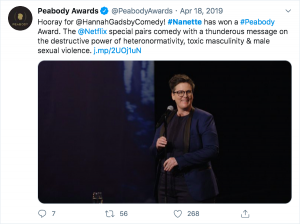
Nanette has won comedy awards in Melbourne, Adelaide and the prestigious Edinburgh Fringe Festival. Nanette received praise from the Atlantic, The New York Times and The Washington Post. It was released on Netflix on June 19, 2018. It became an unexpected hit through its own merit and word of mouth. In 2019, Nanette won an Emmy award.
Inspiration and Intersectionality of Nanette:
Nanette at its core is an intersectional work of art. Gadsby uses a medium that is thought of as lowbrow, yet accessible to the masses. Nanette’s content is touches upon gender inequality, the experiences of LGBTQ+ people in Australia and her own physical and sexual abuse.
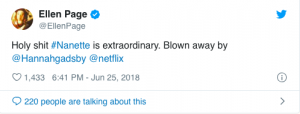
Gadsby is well aware that her success in comedy would not have been found in other fields of the arts due to her rural Tasmanian origins, “Comedy is great in that it’s accessible to someone like me, from a low socioeconomic background, struggling in life. The gatekeepers are a lot stronger in other art forms.”
Nanette was written after Hannah Gadsby’s ADHD and Autism diagnoses. Gadsby elaborated on how her Autism diagnosis influenced her work in an interview, “I’m sorting out what’s wrong with me,” whereas then I’m like, “Oh, I know what’s wrong with me. I know my limits.” But then I turned my critical eye onto the world. And I’m going, “I can also see your limits.”
“‘Nanette’ is very much about how I think and about autism, but I made a conscious decision not to use that word because I didn’t want people to watch that show through the prism of what anyone thinks they already know about autism,” Gadsby said. “Which is quite often not positive. It’s sort of like, ‘Oh, you’re limited.’ So I now talk openly about it because it’s like, ‘Yeah it’s alright.’ But also I think people don’t know a lot about it, particularly, women’s experience on the spectrum.”– Hannah Gadsby
While Gadsby is open about her neurodiversity, she purposely choose to keep any mention of it out of Nanette because she didn’t want the audience to view her work differently. Gadsby’s upcoming work Douglas, touches more on her neurodiversity.
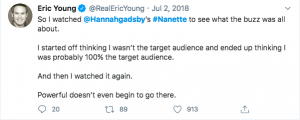
Similar Feminist Themes in Academia:
Gadsby’s work has been compared to that of other queer comedians, such as Tig Notaro. However, it would be a bastardization to Gadsby’s work to only draw comparisons within the same genre. Gadsby’s work has parallels to many different pieces of art, literature and film. Notably, Gadsby’s sentiments about existing on the fringes of society and being incorrectly female are similar to the writing of the Combahee River Collective in North America and the writings of Audre Lorde. 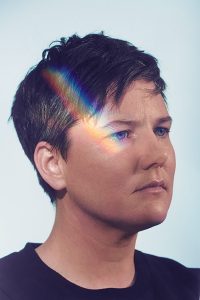
It is important to note that the Combahee River Collective was a group of black lesbians and their blackness is central to their experience and thus their writing. Both Gadsby and the Combahee River Collective touch upon the psychological toll that their existence places upon them and the power of connection and solidarity. Both the Collective and Gadsby specifically mention their appreciation for men that stand as allies to their plight. Similarly, Audre Lorde: “ For women, the need and desire to nurture each other is not pathological but redemptive. And it is within that knowledge that our real power is discovered… it is this real connection that is so feared by the patriarchal world”.
Lorde says, “the masters tools will never dismante the master’s house”. Gadsby quotes cites her mothers apology as a turning point in her life, “ I knew well before you did, that your life was going to be so hard. I knew that, and I wanted, more than anything in the world, for that not to be the case. And now I know that I made it worse. I made it worse because I wanted you to change, because I knew that the world wouldn’t.”
As Audre Lorde said, “the silence will not protect you”,
Hannah Gadsby said, “by the time I identified as being gay, it was too late. I was already homophobic… what you do is you internalize that homophobia and you learn to hate yourself. Hate yourself to the core. I sat soaking in shame… in the closet, for ten years. Because the closet can only stop you from being seen. It is not shame-proof. When you soak a child in shame, they cannot develop the neurological pathways that carry thoughts of self-worth.”
As Audre Lorde said:
“I have a duty to speak the truth as I see it and share not just my triumphs, not just the things that felt good, but the pain. The intense, often unmitigated pain. It is important to share how I know survival is survival and not just a walk through the rain,”
Hannah Gadsby said:
I just needed my story heard, my story felt and understood by individuals with minds of their own… I just don’t have the strength to take care of my story anymore. I don’t want my story defined by anger.
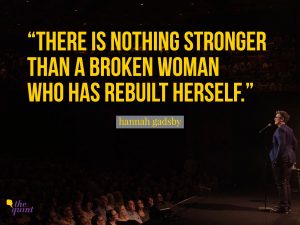
Further Reading:
A Black Feminist Statement by The Combahee River Collective
The Master’s Tools will never Dismantle the Master’s House by Audre Lorde
Ten Steps to Nanette by Hannah Gadsby
Douglas by Hannah Gadsby
References: